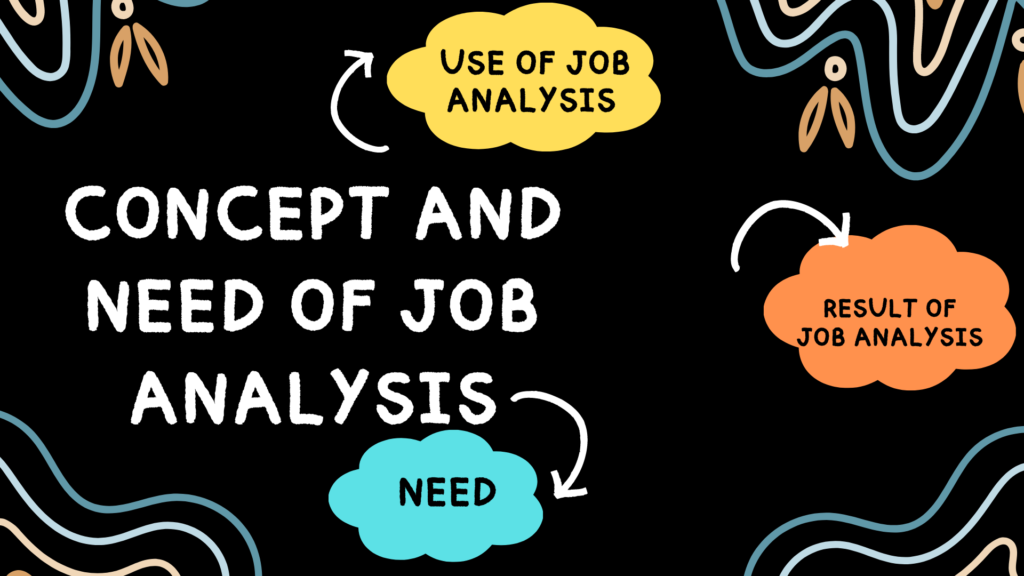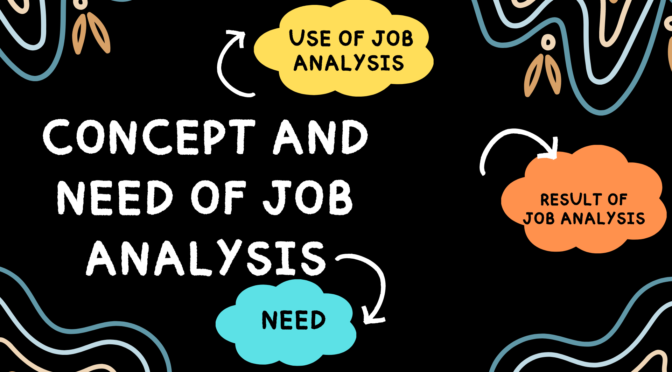Job analysis is a process of gathering and analyzing information about a job in order to understand its duties, responsibilities, and requirements. The goal of job analysis is to provide a detailed understanding of what a job entails, in order to support important HR activities such as job design, recruitment and selection, performance appraisal, training and development, and compensation and benefits. Here are the details about the concept and Need of Job Analysis :
There are several methods for conducting job analysis, including:
- Observation: The analyst observes the employee performing the job and records the activities, skills, and requirements of the job.
- Interview: The analyst conducts a structured interview with the employee and/or the supervisor to gather information about the job duties and requirements.
- Questionnaire: The analyst provides a questionnaire to the employee and/or the supervisor to gather information about the job duties and requirements.
- Critical Incident Technique: The analyst collects examples of specific incidents that are critical to the job and analyzes them to identify the job duties and requirements.
The information gathered through job analysis typically includes:
- Job description: A written summary of the job duties, responsibilities, and requirements.
- Job specifications: A list of the knowledge, skills, abilities, and other characteristics required for successful job performance.
- Performance standards: The criteria for measuring successful job performance, including metrics such as quality, quantity, and timeliness.
- Work environment: The physical and social context in which the job is performed, including factors such as lighting, temperature, noise, and social interactions.
Need of Job Analysis :
Job analysis is a crucial activity for any organization as it provides valuable information about the duties, responsibilities, and requirements of a job. The following are some of the key reasons why job analysis is necessary:
- Job design: Job analysis provides valuable insights into the requirements of a job, enabling organizations to design jobs that are efficient, effective, and safe. By understanding the specific duties and responsibilities of a job, organizations can create job descriptions that clearly outline the expectations for the position and the necessary qualifications for potential candidates.
- Recruitment and selection: Job analysis is essential for effective recruitment and selection practices. By understanding the key duties and requirements of a job, organizations can develop job postings that accurately reflect the job, target qualified candidates, and screen out unqualified candidates.
- Performance management: Job analysis is necessary for setting performance expectations and goals. By analyzing a job, organizations can identify the critical job tasks, knowledge, and skills that are required for successful job performance, and develop performance standards that are clear, objective, and measurable.
- Training and development: Job analysis provides information about the specific knowledge, skills, and abilities required for successful job performance. This information can be used to identify training needs and develop training programs that are tailored to the needs of the job and the organization.
- Compensation and benefits: Job analysis is important for determining appropriate compensation and benefits for a job. By analyzing the job duties and responsibilities, organizations can determine the relative worth of the job and ensure that employees are paid fairly and equitably.
- Compliance: Job analysis is necessary for compliance with legal requirements such as the Americans with Disabilities Act (ADA) and the Fair Labor Standards Act (FLSA). By analyzing a job, organizations can identify the essential job functions and the physical and mental demands of the job, which can be used to evaluate accommodation requests or determine appropriate compensation.
Once the job analysis is completed, the results are used to support a range of HR activities, including:
- Job design: Using the information gathered in the job analysis to create or modify job duties, responsibilities, and requirements.
- Recruitment and selection: Using the job description and job specifications to identify candidates who possess the necessary knowledge, skills, abilities, and other characteristics for the job.
- Performance appraisal: Using the performance standards to evaluate employee performance and provide feedback.
- Training and development: Using the job analysis to identify training needs and develop training programs that address those needs.
- Compensation and benefits: Using the job analysis to determine appropriate compensation and benefits for the job.
Also Visit : Prep with Harshita

Also Read : Functions of a Counselor


26 thoughts on “Concept and Need of Job Analysis”